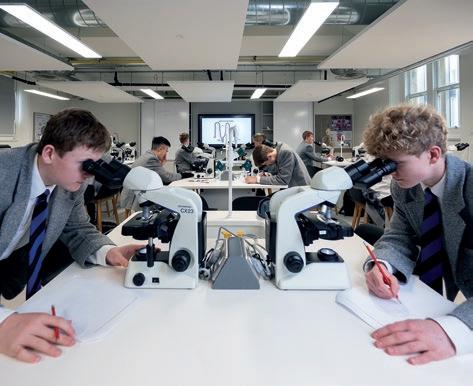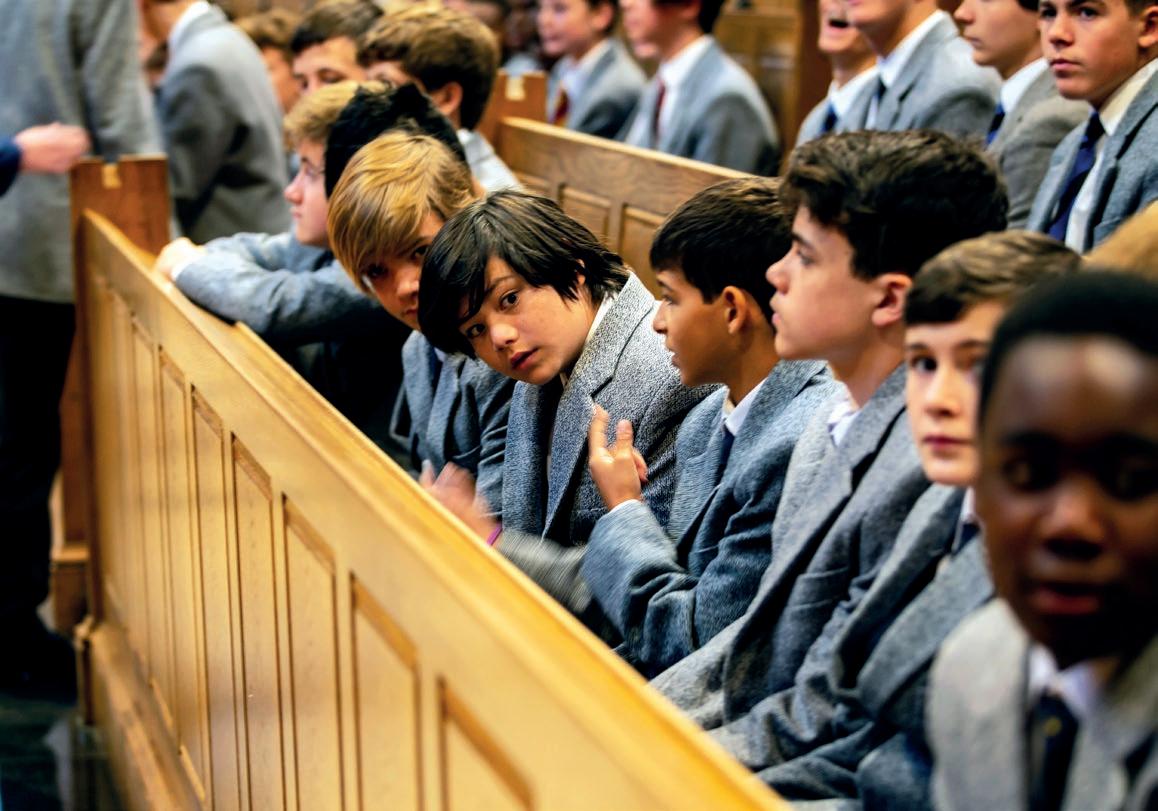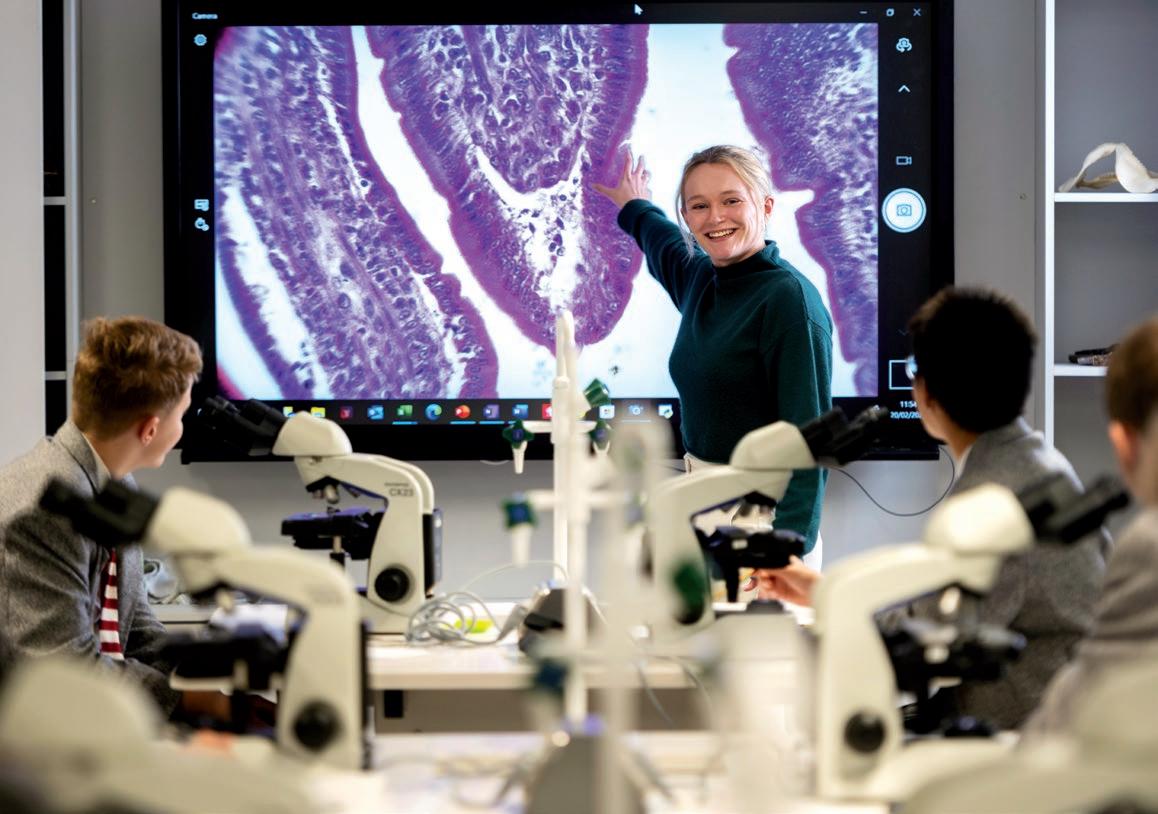
3 minute read
SCIENCE
Science is a core subject in the National Curriculum. Science education plays an important role in developing a population that will make good choices, both for themselves and for the global community. It can offer a rich context for developing many 21st century skills, such as critical thinking, problem-solving and information literacy. All pupils study the separate subjects of Biology, Chemistry and Physics through to the Third Year, where a significant portion opt to continue at least one science subject at A-level.
With a focus on scientific thinking, analysis and experiment, the foundations are laid in the Novi to encourage boys to be curious about the world around them. We equip them with the knowledge and skills to understand current advancements in science and prepare them for those yet to come.
Taking advantage of the wonderful facilities available in the Barton Science Centre, boys are encouraged to attend the weekly Science Society, where a series of fun and engaging experiments or competitions are organised in rotation between the three sciences.
Biology
The Biology course for the Novi seeks to excite and engage all boys, irrespective of their experience of the subject at their previous school. The course is heavily practical in the Michaelmas and Lent terms, establishing confidence and proficiency in the laboratory through a variety of exciting activities including use of our superb microscopes, growing bacteria, investigations of enzyme activity, osmosis, diffusion and dissection.
Data analysis and ICT skills are developed, along with pupils’ understanding of the fundamental biochemical concepts that explain their own observations. Their new knowledge is consolidated, applied and contextualised during the spring, in the study of the digestive system.
As we move into the summer, we explore how plants take up water and adapt to arid conditions, and we study the process of natural selection. This leads into work on biodiversity and ecological sampling. Throughout the year, lessons are followed up with carefully considered preps that aid consolidation and give opportunities for independent research and extension.
Our ambition is that boys complete their first year with a clear understanding of important core concepts that will lay strong foundations for the remainder of the IGCSE Biology course, and that they will have fun.
Alongside timetabled lessons, the Biology Department promotes a strong culture of super-curricular engagement and enrichment. The Department has its own cosy library area, and the collection is constantly updated with periodicals and recommendations from the staff’s own reading. Biology Club meets during Monday pursuits, with specific, optional activities for the Novi, in rotation with the other sciences that are led by older boys. In addition, the most enthusiastic undertake their own independent research projects with support and guidance from staff.
Chemistry
As the ‘central’ Science, Chemistry sits between Physics and Biology, with ideas from Chemistry overlapping with the other two sciences. The lines where one science finishes and the others start can become blurred at times.
There is an exciting mix of theory and practical work as students move through the course. The basics of practical work are covered in the Novi, where students typically work in pairs, although occasionally individually, to complete as many practicals as time allows, building confidence with equipment and techniques.
Concepts include the structure of atoms, ionic and covalent bonding, types of reactions and reaction kinetics alongside consolidation of ideas that will typically have been encountered previously, such as diffusion and states of matter.
Students’ understanding is assessed regularly through end-of-topic tests, alongside the larger Whole School assessments: the Novi Michaelmas exam and the end-of-year exam. Students are able to meet with teachers outside lessons to go over areas of weakness. There is an extensive virtual learning environment, with videoed explanations of topics and ‘test yourself’ questions in the Department’s Firefly pages.
Physics
During the First Year, the course covers a range of topics and there is a balance between learning through discussing concepts and ideas, hands-on practical and experimental work, and mathematical skills.
It is recognised boys coming from different schools will have differing levels of knowledge in the subject, and therefore all boys follow the same course, taught at the same rate, during their First Year.
During the Michaelmas Term the boys will learn about density and pressure, why objects float and sink, and how atmospheric and hydraulic pressure influence our everyday lives.
The Lent Term includes forces and motion, covering why and how objects move and Newton’s laws of motion. The Summer Term sees the focus move on to static electricity and magnetism, before preparation for the summer exams.
All of this learning occurs in the School’s world-class Barton Science Centre. The labs are large, giving space for experimentation, and are extensively equipped, providing a range of apparatus for demonstrations and experiments. Much of our demonstration apparatus is made bespoke by our in-house team, and includes a number of pieces not found in any other school in the UK. This helps bring the subject to life and, using the Van De Graaff generator, will literally make hairs stand on end!











